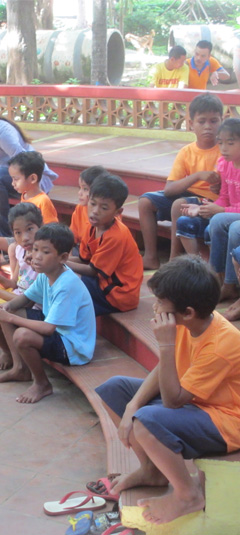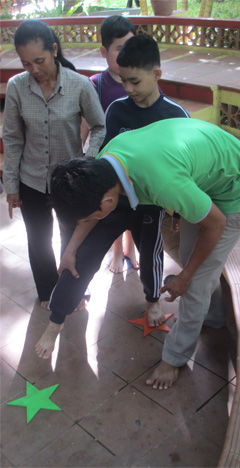|
Child abuse and neglect the emotional effect |
|
|
What is Child Abuse? All parents upset their children sometimes. Saying ‘No’ and managing difficult behaviour is an essential part of parenting. Tired or stressed parents can lose control and do or say something they regret, and may even harm the child. ‘Abuse’ is defined as significant harm to health or development caused by physical punishment, injury, verbal threats or sexual abuse. It can also be caused by neglect. This occurs when a parent fails to provide adequate care for the child, for example, sufficient food, stimulation or supervision to ensure safety, so it harms their health and development. Children are usually abused within the family or by familiar adults, but sometimes older children and occasionally strangers are involved.
|
|
|
Children who do not go to school |
|
|
School non-attendance is a common problem, and has serious consequences. When a child misses school for long, education is affected, and this may limit the child’s confidence as well as opportunities in later life. Out of school, a youngster easily gets into all kinds of trouble. It is a headache for parents and teachers. Parents may not know how to make their child to attend school regularly. Teachers worry about the reasons for the problem and how to help the child who is out of school. School non- attendance may be due to a number of different factors. There are three main groups: School refusal, truancy and condoned absence. Each of these is discussed below.
|
|
|
Behaviour problem and conduct disorder |
|
|
All children have moments when they are disobedient, or refuse to follow family or social rules. There may be occasions when children will get into tempers and become aggressive or destructive that are inappropriate for their age.
There are some children however who even when quite young seem to have a pattern of difficult behaviour which continues for a period of several months or longer. They repeatedly break the accepted rules of conduct in their family and community in a serious way. In toddlers and young children, there may be refusal to do what they are told by adult despite being asked many times. This often leads to rudeness, swearing, and tantrums. Hitting and kicking of other people is common, as is breaking and spoiling things, which matter to others. A child may steal and lie in a sly way, often with no sign of guilt when found out. Severe behaviour problems of this kind, which affect the child’s development and life, are known as conduct disorder. |
|
|
Coping with Stress |
|
|
What is stress?
Stress refers to situations or events, which leave you feeling under pressure, worried, upset, sad, angry, or with a mixture of feelings. There are quite a few ordinary situations that may cause stress, especially if you are not feeling ‘on top’ of things. Common examples include schoolwork pilling up, preparation for examinations, being teased or bullied, problems with teachers, arguments with parents, and family or close friends. Less common causes include being the victim of bullying or abuse, fighting between parents, family breaking up, illness or death of some one important to you. |
|
|
Death in the family - Helping children cope |
|
|
How does a child respond to death?
When a family member dies, everyone in the family is affected. Children react very differently from adults. Their response will depend upon a number of factors. |
|
|
Depression in children and young people |
|
|
Depression is a common problem. It affects at least two in 100 children under 12 years old and five in every 100 teenagers. Depression is even more common in adults. You may be much more likely to become depressed if you come from a broken home, have lost a parent early in life, have suffered from abuse or neglect, and live in an inner city area where there are high rates of poverty, unemployment and crime. Nowadays there is a great deal that can be done to help people who suffer from depression. The first step to getting help is to be able to recognize the problem.
|
|
|
Discipline and your child |
|
|
What does it achieve?
Many people talk of discipline when they mean punishment. Discipline is much more than punishment alone. It is one way that a parent can show care and concern for a child. Good discipline takes time to achieve. Children need parents to give them the attention they need and the time to understand what is being asked of them. It helps children and young people succeed by learning to fit in with the expectation and rules of their family and society. |
|
|
Drug and alcohol abuse |
|
|
Could it happen to me?
Anyone can fall into drug misuse habit. It is importance to be aware of the situations that may lead to taking drugs that are strongly addictive. However much will-power you may have, it is all too easy to get hooked. We are all in danger of misusing drugs or alcohol. |
|
|
The emotional cost of bullying |
|
|
What is Bullying?
Bullying is a form of aggressive behavior. It is hurtful and deliberate and may be carried out by one child or a group of children. Victims find it difficult to defend themselves. It is often repeated and goes on for a long time, unless something is done about it. |
|
|
The child with general learning disability |
|
|
What is meant by learning disability?
‘Learning disability’ used to be known as mental handicap or mental retardation. If a child has a general learning disability this means that, compared to most people, it is more difficult for them to understand and learn. Such a child will develop more slowly than other children of the same age even during pre-school years. The degree of disability can vary greatly. It can be so severe that the child is unable to speak and even as an adult, will need help with ordinary tasks such as feeding, dressing, or going to the toilet. On the other hand, the disability may be mild so that, in time, the children grow up to become independent. However, even when mildly affected, it will be harder for the child to work things out. This will make it more difficult to cope with the more complex side of life, like managing money. |
|
|
Hyperactivity and attention deficit problems |
|
|
What is hyperactivity? The term hyperactivity is used by professionals to describe children, who are overactive and have difficulties concentrating. In everyday life people often describe children, who become excitable, boisterous or disobedient as hyperactive and in Cambodia they are considered intelligent. But the professionals refer to a more severe and long lasting problem. The term Attention Deficit Hyperactivity Disorder (ADHD) describes very severe hyperactivity and about 1 in 100 primary school children suffer from this problem in developed countries (like U.K or U.S.A). In Cambodia the prevalence rate is not known.
|
|
|
The impact on children and adolescents of divorce or separation of parents |
|
|
Parental separation affects many children in Cambodia and the exact number of children affected is not known. Divorce affects 150 000 children each year in the England. If divorce of married parents and separation of unmarried parents taken into account, nearly half of all children in England will face crisis by the end of their childhoods.
|
|
|
Parent mental illness - The problems for the child |
|
|
How many children live with mentally ill parents?
Psychiatric disorder is very common, and many children will grow up with a parent who suffers from mental illness. The majority of these parents will have minor or short- term illnesses, generally treated by their family doctors or general practitioners. A few children live with a parent with severe mental illness such as schizophrenia or manic-depressive illness. Many more children, especially those who live in inner cities, live with a parent who has a long-term problem such as alcoholism, drug misuse, learning difficulties, personality disorder or longstanding depression. |
|
|
Severe mental disorder in children and young people |
|
|
How common are mental health problems in young people?
The childhood and teenage years are usually healthy ones, but for some young people this period can be troubled by mental health problems and mental disorders. Minor mental health problems are as common in young people as in adults. Problems can be emotional, sexual, or behavioural. These can worry parents and friends, but are usually understandable in term of the problems of growing up. For instance, four out ten adolescents have felt so miserable that they have cried and have wanted to get away from everyone and everything. Most problems of this kind can be resolved with help and support from family and friends. |
|
|
Sleep problems in childhood and adolescence |
|
|
Why sleep problem matters
Sleep problems are very common. Most children?s sleep problems occur only occasionally. They are not serious and improve with time. Persistent sleep problems, need to be taken seriously because they may indicate the child has a psychological or physical disorder. In addition, learning and behavior may be affected due to the sleep problem. If parent?s sleep is regularly disturbed, as happens often, they may be upset. The parents may become anxious and worry about what may be causing the problem and what should be done. |
|
|
Children who wet themselves |
|
|
How common is bedwetting?
Bedwetting, or nocturnal enuresis, affects one in six school (primary) going children. Boys wet the bed more than girls. Usually children become ‘dry’ around three years, but there is a lot of variation among children. Parents should be a little worried if a six- year-old still wets the bed at least once a week or starts to bedwet again after being dry. |
|
|
Specific learning difficulties |
|
|
What is specific learning difficulty?
A child with specific learning difficulty is as able as any other child except in one or two defined areas. This may be in the ability to recognize letters, to cope with number or in one of many other skills. There are many forms but the best known is probably dyslexia, where the child has difficulty with written symbols so that there are problems with reading and spelling, in spite of being intelligent. It may be difficult for parents and teachers to realize that the child has specific learning difficulty, especially if development was normal in the early years. Often, the child will understand, have good ideas, join in story telling and other activities, like other children. Some time it can take years for adults to realize that the child has a specific difficulty. |
|
|
Traumatic stress in children: How parents can help |
|
|
What is Traumatic Stress?
When children experience or witness an overwhelmingly frightening (traumatic) event, they are likely to show signs of extreme stress in the way they think, feel and behave. It is important to recognise these normal reactions, so that you can help your child regain a sense of security and well-being and also know when to request professional assistance and care. Although catastrophes like earthquakes, fires, floods, plane crashes, shootings and war attract major media attention, because they affect whole communities, the effects of most common individual tragedies like road accidents or dog-bites, may be just as severe for the individual child. |
|































